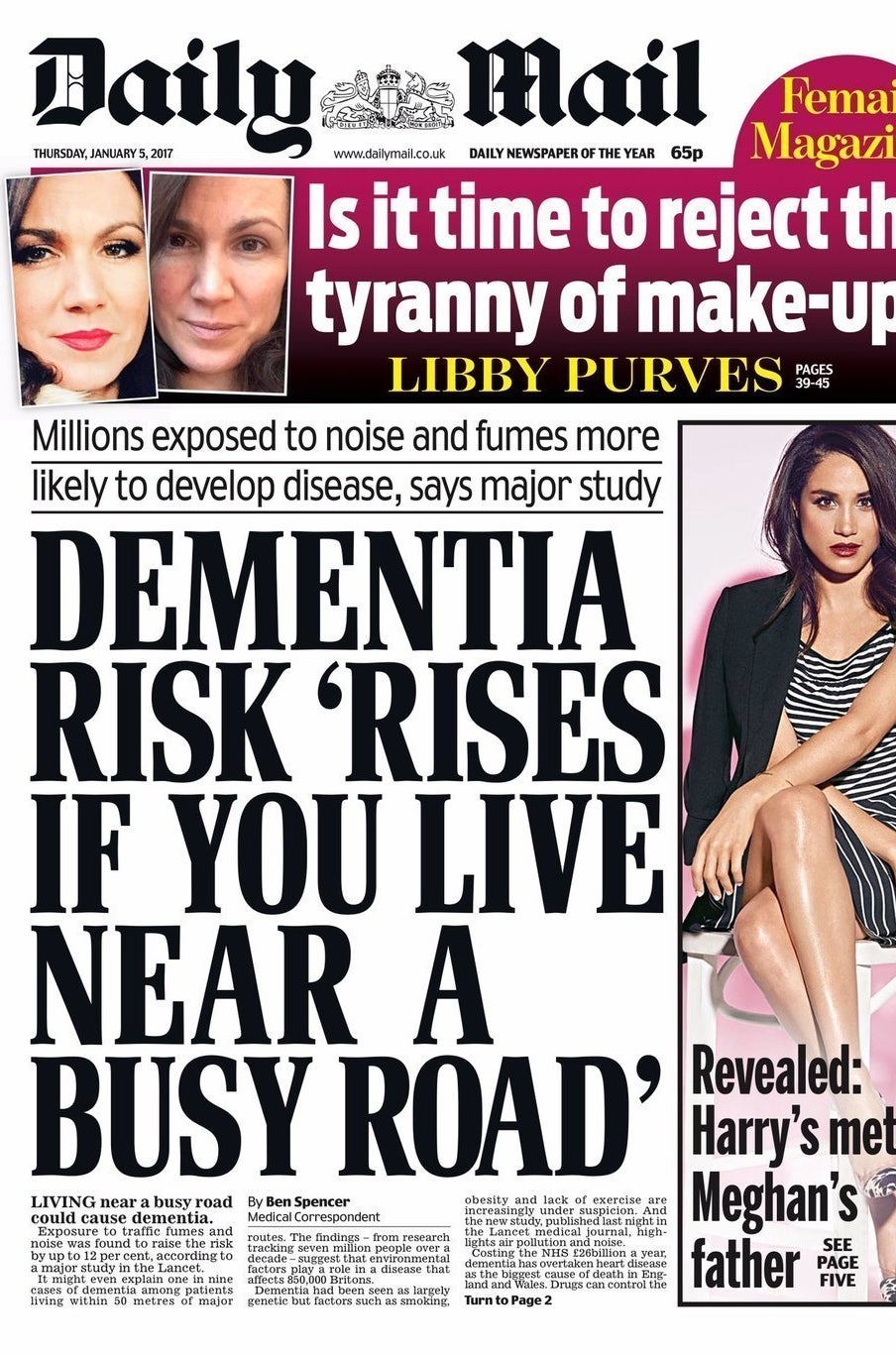There's a story on several newspaper front pages today linking busy roads with an increased risk of dementia.



The Daily Express even goes as far as to say that busy roads "can cause" dementia.
The reports follow a paper published in the Lancet medical journal on Wednesday evening.
It was conducted by researchers in Canada and followed 2.2 million people aged 55 to 85 who lived in Ontario in 2001. The researchers tracked how many of these people developed dementia or Parkinson's disease over a decade.
The study also followed 4.4 million people aged 20 to 50 over the same period and tracked how many developed multiple sclerosis.
Over the course of the study, around 244,000 people developed dementia, 32,000 people developed Parkinson's disease, and 9,000 people developed multiple sclerosis.
But there are several things you should know about the study before you open up Rightmove and start trying to find a nice quiet road to live on.
1. The study found that around 1 in 10 of cases of dementia in people who live within 50 metres of a busy road might be attributable to traffic exposure.

2. The study doesn't show causation, only correlation.
In other words, the study does not prove that busy roads actually cause dementia (despite what the Daily Express says). But it does show that there seems to be a link between the two, suggesting that living near a busy road might be a risk factor for dementia.
Dr David Reynolds, chief scientific officer at Alzheimer's Research UK, said in a statement: "This research is interesting in its identification of an association between dementia and major roads, but if any causal link exists between these two factors, it can’t be confirmed by this study.”
Dr Doug Brown, research director at Alzheimer's Society, said in a statement: "Although this was a thorough study in a large number of people, the research hasn’t yet shown what causes this link, so we can’t be sure that reducing pollution or noise from traffic would decrease the risk of dementia."
3. The authors of the study did try to control for other factors, but that's easier said than done.
Lots of factors affect where someone lives in a city, so there could be something other than busy roads at play here, skewing the results. But the authors say they did their best to make sure this didn't happen, by taking into account various social factors like education in their analysis.
Professor Tom Dening, director of the Centre for Old Age and Dementia at the University of Nottingham, told the Science Media Centre: "We simply can’t tell if it’s down to pollution or some other reason. It is of course important to make statistical adjustments for factors concerning health and social deprivation. For example, if you live half a mile up a private drive you are probably more prosperous than someone living right by an inner-city flyover. The authors have made this adjustment but it is always an open question as to whether the adjustments are sufficient to exclude really big effects from poor health and social deprivation."
4. Air pollution particles did not explain the effect fully.

5. More research is needed before we can say how big a risk factor living near a busy road is.
We already know about several risk factors for dementia. The big one is age, and genetics plays a part, as well as diet, exercise, and smoking. This study suggests that exposure to air pollution from living near a busy road may be something we need to add to the list of known risk factors.
"This study has identified major roads and air pollutants from traffic as possible risk factors for dementia, a finding which will need further investigation before any firm conclusions can be drawn about the relative risks of air pollutants for dementia versus other risks such as smoking, lack of exercise, or being overweight," said Reynolds.
6. But while this study isn't enough to say whether you personally should move house, it could be useful to policymakers.
Professor Martin Rossor, NIHR national director for dementia research at University College London Hospitals, told the Science Media Centre: "Whilst this study does not provide sufficient reason to drive individual choices if available it is an important public health message on the dangers of air pollution and the contribution of the built environment in responding to the dementia challenge.”
In fact, the authors themselves say: "This study suggests that improvements in environmental health policies and land use planning aimed at reducing traffic exposure can have considerable potential for prevention of dementia, which would lead to a broad public health implication."
